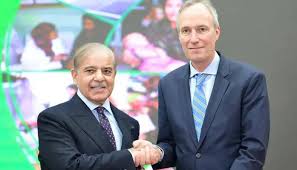World Bank official says Pakistan can become $1 trillion economy by 2035
Pakistan has the potential to
transform into a $1 trillion economy by 2035 if it can maintain a sustainable
annual growth rate of 7%, according to Martin Raiser, Vice President for South
Asia at the World Bank.
While acknowledging the
uncertainties surrounding long-term forecasts, Raiser emphasized that achieving
this milestone hinges on the successful implementation of Pakistan’s domestic
economic recovery plan.
A
Realistic Target
"Achieving this target is
entirely possible, but it will require significant economic reforms and robust
policy measures," said Raiser. He highlighted the World Bank’s commitment
to providing $20 billion in funding over the next decade, conditional on
Pakistan's economic capacity and reform progress.
Raiser underscored the importance of
addressing key challenges, such as attracting foreign investment, improving
trade relations, and strengthening institutional frameworks, to sustain the 7%
growth rate.
Read More World
Bank concerned over obstacles in privatization of Pakistan’s State Owned
Entities (SOEs)
Building
Consensus
To drive the reforms forward, Raiser
revealed that he has engaged with representatives from Pakistan’s political
parties and civil society to build a consensus on economic strategies.
He clarified that the World Bank’s
$20 billion funding is “conditional and indicative,” contingent on Pakistan’s
ability to execute necessary reforms and meet repayment obligations.
World
Bank’s Role in Reform
In a meeting with Finance Minister
Muhammad Aurangzeb, Raiser discussed the World Bank's support for critical
economic and tax reforms. This includes implementing a fiscal pact to enhance
revenue collection and spending efficiency.
The $20 billion funding forms part
of the World Bank’s Country Partnership Framework for Pakistan (FY26–35),
launched recently. The framework aims to address pressing issues like economic
instability, poverty, and climate change.
Priority
Sectors
Under the 10-year framework, the
World Bank is focusing on six key sectors to drive Pakistan’s sustainable
growth:
- Clean Energy
- Climate Resilience
- Water Management
- Agriculture
- Digital Infrastructure
- Private Sector Development
"We are prioritizing
investments and advisory interventions that attract much-needed private sector
investment to foster sustainable growth and job creation," said Zeeshan
Sheikh, Country Manager for Pakistan and Afghanistan at the World Bank.
Read More World
Bank urges Pakistan to implement real estate sector taxation
Current
Projects and Challenges
Currently, the World Bank has $17
billion committed to 106 ongoing projects in Pakistan. These investments span
vital sectors such as energy, finance, and manufacturing.
As Pakistan navigates an ongoing
economic crisis, experts emphasize the need for bold reforms to stabilize the
economy. The country remains under a $7 billion International Monetary Fund
(IMF) bailout program, which mandates revenue increases and external financing
from partners like China and Gulf nations.
Prime Minister Shehbaz Sharif hailed the World Bank’s framework as a “timely
intervention” to address Pakistan’s pressing economic and climate-related
challenges, describing it as a blueprint for long-term resilience and growth.
Source: Gulf News
